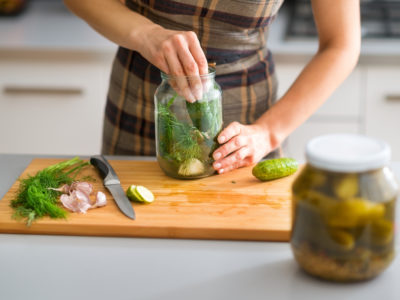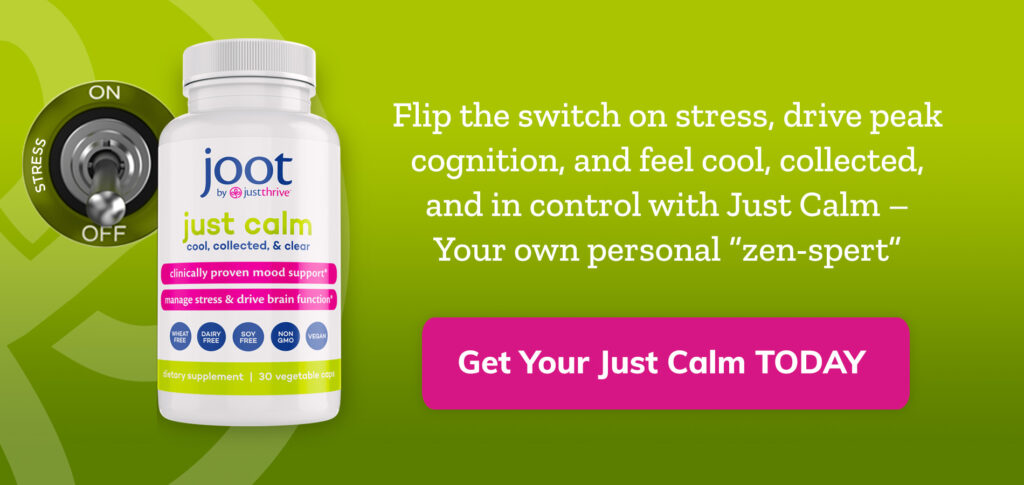Table of Contents[Hide][Show]
They may seem like two completely different and separate issues: gut health and mental health.
And yet, the undeniable evidence of their connection is present almost every day: gut feelings, nervous “butterflies” in your stomach, craving comfort foods when you’re under pressure.
When you stop to look at the signs, there’s no doubt that your mental health and gut health are related. When one is thrown “off,” there’s a good chance that the other one will be, too. On the plus side, taking care of your gut can reduce anxiety, just as reducing your anxiety will promote gut health.
Or, as we like to put it: happy gut = happy mind.
In this article, we’ll explore the connection between anxiety and your gut, as well as ideas for improving the health of both.
How Anxiety and Gut Health Affect One Another
The connection between anxiety and gut health is referred to as the gut-brain axis. The gut-brain axis is the two-way communication between the central nervous system and enteric nervous system (the organs and the gut microbiome found in the gastrointestinal tract).
The GI tract releases neurotransmitters and hormones like serotonin and dopamine which affect brain function and mood. A lack of production of either of these neurotransmitters is largely responsible for mental illnesses such as depression and anxiety. If the microbes in your gut are unbalanced it can lead to less production of these necessary “happy hormones” and cause stress as well as anxiety and depressive symptoms.
The gut-brain axis can also be thought of as a cycle that can contribute to anxiety in other ways.
- Poor gut health results in digestive issues including constipation, bloating, gas, and diarrhea. Having to deal with these in public settings or at the office can be embarrassing, and lead to anxiety.
- Feelings of anxiousness can result in an upset stomach or digestive issues.
It’s a little too easy to get stuck in a cycle where gut issues cause spiraling anxiety, which worsens the gut issues, which then causes more anxiety.
There’s only one way to break free of that scenario, and it’s by taking control of both your anxiety and gut health.
Why It’s Important to Understand the Gut-Brain Connection
The biggest benefit of understanding the connection between the gut and the brain is how it opens up treatment options for physical and emotional disorders, including anxiety.
Take irritable bowel syndrome (IBS), for example. Because it’s a digestive issue, you might think that the only course of treatment is one that focuses on gut health. However, that’s not the case.
Now that scientists understand the gut-brain link, they realize that they can use the brain to treat digestive issues such as IBS. And in fact, one effective treatment for IBS is prescribing antidepressants. This doesn’t mean that the patient is suffering from depression. But by calming the mind, the relaxed signals it sends to the gut can alleviate IBS symptoms.
Or maybe you’re dealing with persistent stomach cramps. Extreme stress can cause your stomach to contract, leading to cramps. When you remove the stress (or remove yourself from that stressful situation), your stomach relaxes and the cramps will go away.
Stress can also have a negative impact on your digestion because it affects your hormone levels. Since hormones are part of the digestive process, a hormonal imbalance can lead to bloating, indigestion, abdominal pain, and other issues.
Related
What is the Gut-Brain Axis?
Learn how the connection between the gut and brain—the gut-brain axis—influences your mental and digestive health and how you can support both simultaneously through the foods you consume.
Improving Your Gut Health
In the current mindset of masks and disinfectants, we’re avoiding bacteria like…well the plague, but that’s not always the best plan of action.
There are trillions of bacteria living on and in your body right now, especially in your gut. And believe it or not, a good number of those bacteria are actually crucial to a healthy, functioning body.
Your “gut microbiota” is another way of describing the millions of microorganisms that live inside your gut. And sure, some of these are the “bad” microbes that easily come to mind when we think of bacteria.
But many of these gut bugs are “good” or “beneficial” bacteria. The good bacteria in your gut are crucial to your health. They affect your entire body, especially your immune system, and support your overall wellbeing.
In an ideal environment, the good bacteria would outnumber the bad bacteria and you’d have a healthy gut. But it’s all too common for your gut to be unbalanced with a stronger colony of bad bacteria – a condition known as dysbiosis or leaky gut.
When your body is in dysbiosis, the signals that your MGB axis sends to your brain won’t be positive or healthy. So dysbiosis won’t just have physical manifestations, such as digestive issues. It’ll also affect your moods and increase your risk of anxiety.
Long story short: balance your healthy gut bacteria to bad bacteria ratio, and you’re much less likely to experience those waves of anxiety.
Symptoms of an Unhealthy Gut
Poor gut health can affect you physically, emotionally, and mentally. Anxiety is certainly one of the big symptoms that your gut is “off”, but there are numerous others.
In fact, even before you notice your rising anxiety levels, you might start feeling some of the physical symptoms of a gut imbalance:
- Bloating
- Chronic constipation or diarrhea
- Fatigue
- Headaches
- Skin problems (rashes, acne, eczema)
- Joint pain
- Inflammation
Along with anxiety, there are other mental/emotional symptoms that you may be feeling:
- Confusion
- Trouble concentrating
- Depression
- ADD/ADHD
If you’re experiencing a combination of these symptoms, now would be a great time to take proactive steps to heal your gut and regain your gut microbiome balance.
How to Heal Your Gut
So you’ve decided to take control of your gut health? Congratulations! Along with reducing or even eliminating your anxiety, you’ll soon see and feel the changes in the overall health of your body.
Increase Your Intake of Probiotics
One of the most effective things you can do for your anxiety is to rebalance your gut microbiome, tipping the scales in favor of the good bacteria. How can you do that? By introducing more or more powerful probiotics into your system.
Probiotic-friendly foods contain “good” (beneficial) bacteria. These foods boost the numbers and quality of the beneficial bacteria communities already living in your gut, allowing them to multiply and thrive. Since there’s only so much room in your gut, this will essentially “crowd out” the bad (pathogenic) bacteria.
Another reason probiotics help with gut health is that they act as anti-inflammatory agents which strengthen the intestinal barrier. This improves the gut’s composition and function.
Probiotics can also help reduce anxiety in a more direct manner by lowering the production of stress hormones such as cortisol.
Probiotics are usually found in fermented foods and drinks. Some of the best probiotic-rich foods include:
- Kefir
- Kimchi
- Kombucha
- Miso soup
- Pickles
- Probiotic yogurt
- Sauerkraut
- Some soft cheeses
- Sourdough bread
- Tempeh
If these foods don’t fit with your diet or lifestyle, you can also take probiotic supplements. In that case, here are a few things to keep in mind.
- Only buy probiotics from a trusted source.
- Check labels carefully, especially if you have food allergies or sensitivities. Some probiotics can contain soy or gluten.
- Follow instructions carefully. Some probiotics require refrigeration.
- Check expiration dates.
Related
9 Best Vegan Probiotics For Gut Health
If you do not consume dairy, here are some vegan probiotic foods that are are fantastic when it comes to taking care of your gut health.
Choose the Right Foods
The right vitamins and minerals can also contribute to a healthier gut—and lower your anxiety.
Vitamin D can help regulate your microbiome and increase the diversity of good bacteria. Foods rich in vitamin D include egg yolks, tuna, salmon, orange juice, and vitamin D-fortified milk.
Try to avoid heavily processed, sugary foods. These foods can halt the growth of good bacteria, leaving room for the bad bacteria to take over and creating a gut microbiome imbalance.
Move Your Body
Stay active! Studies show that moderate, age-appropriate exercise can enrich the diversity of your gut microbes. When your gut microbiome is out of balance, with bad bacteria flourishing over the good bacteria, exercise can help you regain the right balance. Regular exercise can also help to relieve anxiety by calming you down from any stressors in your life.
If it’s been a while since you’ve exercised, start off slowly. Start by incorporating low-impact exercises such as walking, cycling, or swimming instead of jumping in. You don’t want to end up too sore, or you’ll have to take time off to recover, which could derail your progress.
Improving Your Anxiety
Just as healing your gut can reduce anxiety, the reverse is also true: reducing your anxiety can also heal your gut.
Occasional anxiety is something that most people experience from time to time: nerves before a first date, trouble falling asleep before a big presentation at work, or panicking that you’ve made the right decision for buying a home are all common.
What distinguishes that from an anxiety disorder is that a disorder causes frequent, intense anxiety attacks over seemingly-minor daily situations. This might involve something like being unable to decide what to order at a restaurant or being unable to answer questions during a work meeting.
These episodes can be intense and even crippling, making it impossible for you to participate in your usual everyday activities. They may even lead to you avoiding places or situations that you used to enjoy, just to avoid the anxious feelings they now provoke.
Symptoms of Anxiety
But what, exactly, is anxiety? It’s a term that gets used quite often in the mental health space, without much definition.
So, let’s take a look at what anxiety actually feels like:
- Feeling nervous, tense, or restless
- Feeling an impending danger or doom
- Increased heart rate
- Increased breathing (hyperventilating)
- Sweating
- Shaking or trembling
- Feeling weak or tired
- Being unable to concentrate on anything other than the source of the anxiety
- Insomnia
And physically, anxiety can lead to gastric issues such as:
- Bloating
- Constipation
- Diarrhea
- Gas
- Indigestion
The occasional, mild anxious feelings might not be enough to worry about since they can happen to anyone. But if your anxiety starts to interfere with your everyday life and affect your gut health, it’s time to take steps to reduce or eliminate it.
How to Reduce Anxiety
Our previous suggestions were for a healthy gut. Now let’s focus on techniques that will reduce your anxiety levels—which can improve digestive issues, too.
Cognitive Behavioral Therapy (CBT)
This is a form of psychological treatment that has been proven to help with depression, anxiety, addictions, and more. CBT focuses on strategies that teach patients how to change their negative behaviors and thought patterns.
Some examples of CBT include:
- Role-playing to prepare for stressful situations
- Establishing greater confidence
- Developing problem-solving techniques
- Facing fears and learning to overcome them
- Learning to reframe negative thoughts
- Focusing on mind and body relaxation
Progressive Muscle Relaxation (PMR)
PMR increases your mindfulness by helping you become more aware of how your body is feeling. Specifically, you’ll focus on releasing the tension in your muscles. Combined with other relaxation therapies such as visualization and listening to calming music, it’s been proven effective for gut issues.
Meditation
Meditation is one of the most powerful relaxation tools for calming an overactive mind. If you’ve never practiced meditation before, start off small. Even a 5-10 minute session can be helpful. And if you’re having trouble concentrating, there are plenty of guided meditations online that can help you get started.
Avoid Alcohol and Drugs
The use of alcohol or drugs can worsen your anxiety. Try to limit or avoid them altogether.
However, if you are addicted to these substances, going clean can cause anxiety. Work with a healthcare professional or find a support group while you’re quitting your alcohol or drug usage to lessen any anxiety-producing side effects.
Final Thoughts
Clearly, anxiety and the gut are deeply intertwined, to the point where the health of one can powerfully impact the other. But that’s a good thing because it also means that by healing one, you can heal the other.
Ultimately, your goal is to boost the wellbeing of both your body and mind. And taking some of the positive, healthy steps we outlined above can improve your gut health and reduce your anxiety.
The body all works together and a multifaceted approach that includes some gut-healing, as well as some anxiety reduction, would be your best bet at solving your gut-brain puzzle.
Start some new habits today – with healthy food choices, moderate exercise, and a focus on your mental health – and you’ll be feeling better physically and mentally in no time!
You May Also Like…






